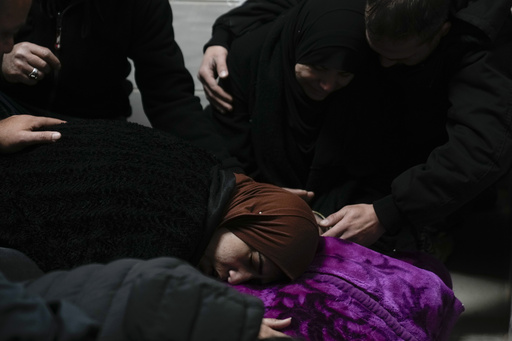TEL AVIV, Israel — On Sunday, Israeli Prime Minister Benjamin Netanyahu announced plans to discuss topics such as “victory over Hamas,” addressing Iran’s influence, and enhancing diplomatic ties with Arab nations during his upcoming meeting with President Donald Trump. This meeting, scheduled for Tuesday at the White House, will mark Trump’s first engagement with a foreign leader since he took office again. It comes as U.S. and Arab mediators embark on the challenging task of facilitating the next steps towards a ceasefire agreement aimed at concluding the ongoing war in Gaza, which has persisted for 15 months.
Since the ceasefire began last month, Hamas has regained control over Gaza and stated that hostages will not be released in the upcoming phases until the war concludes and Israeli forces fully withdraw from the region. Netanyahu faces increasing pressure from ultra-nationalist coalition partners to resume hostilities once the first phase of the ceasefire ends in early March. He has maintained that Israel’s objective remains defeating Hamas and recovering all hostages taken during the militants’ October 7 assault, which prompted the start of the conflict.
The stance of Trump remains ambiguous. Historically, he has been a fervent supporter of Israel but has also committed to ending military involvement in the Middle East. He has claimed credit for fostering the initial ceasefire agreement, which resulted in the release of 18 hostages along with hundreds of Palestinians detained by Israel.
On Sunday, Israeli military engaged in airstrikes, targeting a vehicle in central Gaza, which reportedly resulted in five injuries, including a child in critical condition, according to local hospital reports. Israel explained that the vehicle was struck for violating a checkpoint protocol while heading north.
Ahead of his trip, Netanyahu highlighted that he intends to cover comprehensive topics during his discussions with Trump, including the defeat of Hamas, the release of all hostages, and addressing what he termed the “Iranian terror axis,” which constitutes Iran’s network of allied militant groups in the region, including Hamas. He expressed hopes to fortify security and expand peace initiatives, aiming for a significant period of stability inspired by strength.
The conflict escalated when Hamas militants initiated an assault on southern Israel, resulting in approximately 1,200 fatalities, primarily civilians, and around 250 hostages being taken. During a temporary ceasefire in November 2023, over 100 hostages were released, including eight who were found alive and numerous deceased individuals retrieved by Israeli forces. The ongoing military operations have claimed the lives of more than 47,000 Palestinians, with a substantial number being women and children, though local health authorities have not specified how many were combatants. The violence has led to widespread devastation across cities and displaced roughly 90% of Gaza’s 2.3 million inhabitants.
Under the first phase of the ceasefire, Hamas committed to releasing 33 hostages, of which it claims eight are deceased, in exchange for nearly 2,000 Palestinian prisoners. Israeli forces have decreased their presence in several areas, facilitating the return of hundreds of thousands of displaced Palestinians to the ravaged northern Gaza region, alongside the influx of humanitarian aid.
Negotiations for the second phase, which aims to conclude the conflict and secure the return of approximately 60 remaining hostages, are slated to commence on Monday with the involvement of U.S., Qatari, and Egyptian intermediaries. Qatar’s Prime Minister, Mohammed bin Abdulrahman bin Jassim Al Thani, stated that discussions have already begun to establish a clear agenda, with hopes for progress in the ensuing days.
Trump’s Middle East envoy, Steve Witkoff, has recently been involved in the yearlong ceasefire discussions and met with Netanyahu in Israel last week. As discussions progress, Trump is anticipated to pursue broader agreements, potentially establishing ties between Israel and Saudi Arabia. However, Saudi Arabia has indicated that it will only agree to such arrangements if the war comes to an end and a viable path toward a Palestinian state is presented.
On Sunday, Jordan confirmed that its king is scheduled to meet with Trump at the White House on February 11. Jordan also supports the concept of Palestinian statehood and has declined Trump’s proposal to resettle Palestinians from Gaza to Jordan or Egypt. Meanwhile, Netanyahu’s administration opposes the establishment of a Palestinian state. A significant governing partner, far-right Finance Minister Bezalel Smotrich, has warned that he may exit the coalition if military operations are not resumed next month, creating potential for snap elections that could disrupt Netanyahu’s position.
Families of hostages and many Israelis are expressing frustration. Nissan Kalderon, the brother of recently released hostage Ofer Kalderon, lamented the prolonged suffering endured by families of hostages.
In addition to the situation in Gaza, Israeli military operations have intensified in the West Bank. On Sunday, authorities stated an expansion of operations in the contentious city of Jenin to include the surrounding town of Tamun, claiming the elimination of over 50 militants to date. The Palestinian Health Ministry reported the killing of a 73-year-old man by Israeli troops in Jenin, during what the military described as an engagement with a potential suspect.
While the Gaza ceasefire has remained in place, violence has surged in the West Bank, with Israeli forces conducting frequent raids. Reports indicate an increase in violence from Israeli settlers against Palestinians and retaliatory strikes by Palestinians against Israelis. The situation in Jenin remains precarious, as Israeli forces have conducted controlled demolitions, demolishing various structures allegedly utilized by militants.
Recent assessments from a United Nations humanitarian agency indicated that Israeli operations have heavily impacted residential areas, leading to the destruction of over 120 homes, with additional damages reported from Palestinian security forces. The ongoing conflict has persisted as violence escalates within the West Bank, indicating a grave humanitarian crisis amidst broader regional instability.




